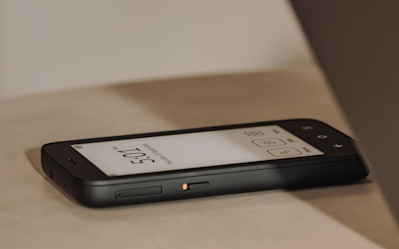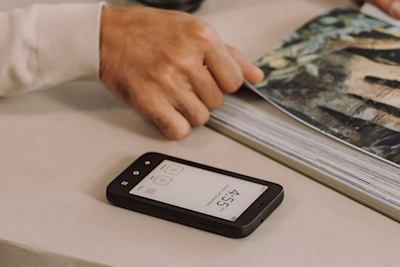
Does Screen Time Impact Your Happiness?
“The purpose of our lives is to be happy.” — Dalai Lama
Is life REALLY better with WiFi?
Have you ever wondered why some people always seem genuinely happy, while others seem to experience a near constant state of stress, frustration and endless disappointment?
We all want to be happy, however, sometimes it seems some people are just happier than others. Is there a secret to happiness?
Recently, we explored the concept of intentionally unplugging from technology and the numerous benefits which can be gained by living in the present moment.
These topics underline the advantages of taking the time to disconnect from screens, while spending time with friends and loved ones and participating in offline activities.
These days, almost everybody owns at least one smartphone, not to mention, other digital devices such as tablets and laptops. And we DO spend a significant amount of time on them. Adults, on average, spend in excess of 11 hours per day staring at screens.[1]
As our use of mobile devices progressed, the research evidence has also accumulated: Excessive screen time is not good for us.[2] It’s not good for us when it comes to our physical, mental, or emotional health. To further exacerbate the negative effects social media now dictates how we view the world. It affects how we receive information, decipher the news, interact with friends and loved ones, and generally navigate through our daily existence.
Although digital devices have the potential to help people overcome the limitations of accessing the Internet in a traditional manner, they do come with their own set of problems.
Is your smartphone making you miserable?
Cell phones have come a long way. The arrival of the iPhone, in 2007, ushered in the era of the smartphone. This single piece of technology has not only impacted virtually every aspect of our existence, it literally turned the need for human connection upside down, causing us to rethink the way we experience the world around us.
Slowly over the years, we’ve become tethered to our devices, allowing them to syphon some of the most precious commodities on earth, our time and attention.
Nowadays, whether you’re chatting with friends, finding a date, ordering food, watching a movie, shopping for clothes, hailing a cab, listening to music or doing just about anything else you can think of, there’s a good chance you’re doing this while interacting with a screen, most likely on an app in a smartphone that didn't exist 11 or 12 years ago.
Consistent with science, does this significant amount of smartphone use affect our happiness? Perhaps we could be happier if we spent less time staring at our phones and more time interacting with people in real life?
Currently, the global average of endlessly scrolling on social media apps such as Facebook, Instagram, Twitter as well as others, consumes approximately 145 minutes per day of every person’s life.[3] That’s over 2.5hrs per day spent on seemingly needless interactions with people whom we may or may not know.
Daily time spent on social networking by internet users worldwide from 2012 to 2020 (in minutes)
For years, researchers have warned us: online social networks are much different from a real-life social circle. Pointing out that interacting with strangers on social media may have a negative impact on our own self-esteem.[4]
A recent study published in the American Journal of Epidemiology established a very definite link between Facebook use and overall wellbeing. According to the author of the study, Holly Shakya, assistant professor and social media researcher at the University of California in San Diego. ".... the more you use Facebook over time, the more likely you are to experience negative physical health, negative mental health and negative life satisfaction.”[5]
The more time individuals spent on social media per day, “the greater the association with anxiety symptoms and the greater likelihood of an anxiety disorder,” says Anna Vannucci, a research associate at Connecticut Children’s Medical Center and coauthor of a study published in the Journal of Affective Disorders[6].
There is an overwhelming conclusion from published research which links time spent on social media to a rise in mental health challenges such as depression, stress and anxiety.[6]
The good news is that taking regular breaks from screens is a powerful way to improve our well-being. However, can it make us happier?
Actually, yes, research shows it can. A 2018 report from the American Psychological Association, states that less screen time actually results in increased happiness in teens and adolescents. [7]
How about in adults? According to a 2016 study from Denmark, found that refraining from social media use seems to improve mood and leads to higher levels of general well-being. When compared to those who kept accessing Facebook as usual, the participants who unplugged from the social media network experienced big jumps in life satisfaction and positive emotions.[8]
The study data underlined that the more the participant had used Facebook prior to disconnecting from the network, the greater the happiness boost felt after quitting social media.
Want to be happier? Try reducing your screen time
Happiness begins with a choice.
Consider reducing the time you spend on your smartphone. Although that may be easier said than done, when our smartphones are practically super-glued to our hands. Also, it's understandable quitting social media “cold turkey” might be quite unrealistic for most individuals, since their smartphones, laptops & computers are their primary links to friends, family, school and work.
As you read, studies have shown that spending more time on screens, especially on social media, is linked to higher levels of anxiety and lower overall life satisfaction. With constant notifications, multitasking, and a flood of information, it becomes harder to focus on the present moment and connect with what truly matters.
Mudita Kompakt- More Offline, More Life
To help counteract these challenges, Mudita is introducing a new minimal phone, Mudita Kompakt. It's a phone designed specifically for people who want to reclaim their time, focus, and overall happiness. This minimalist phone embodies Mudita’s philosophy of simplicity and mindfulness, offering essential features without the distractions and complexities of modern smartphones.
With its clean and custom operating system, Mudita Kompakt encourages healthier relationships with technology by reducing screen time, shielding users from constant notifications, and helping them stay present in real-world experiences. By choosing a minimal phone like Mudita Kompakt, you're prioritizing a lifestyle that fosters focus and happiness while safeguarding your data and privacy.
Yes, analyzing what makes people happy or unhappy is always tricky, since much of what determines happiness might be beyond our control. However, we do have control over how we spend our time and science is slowly pointing us in the right direction. According to what experts know today, taking frequent breaks from social media will most likely brighten your day. In most research, researchers want to make it clear that they aren’t completely demonizing the use of your smartphones, however, like with everything in life: Moderation is key.
If you're interested in learning about how to manage your screen time and limit the time you spend on digital devices, check out these interesting articles and learn more about how to manage your time, stay focused and be happy.
Get ready to experience Mudita Kompakt!
This phone is ideal for those who want to reclaim their time and focus on what truly matters, whether that’s spending quality time with loved ones, engaging in creative pursuits, or simply enjoying a quiet moment of solitude without the temptation of a glowing screen.
Check out the dedicated Mudita Kompakt page: https://mudita.com/kompakt/
Related stories

Why Phones Without Internet Are Trending
Do you know why phones without internet are trending? Learn how Mudita Kompakt's E Ink display and offline mode balance functionality with digital wellness.

It’s official! Kompakt is now shipping to North American Backers
The North America Optimized Mudita Kompakt, our minimalist phone designed for mindful living, is now shipping. See what to expect and how to track your order.

Embracing Mindful Technology for Better Relationships
Reduce screen time, improve communication, and build deeper connections with mindful tech. Discover tips for a more present, meaningful life.
If you'd like to receive the best stories from our blog, keep up to date with our progress and get notified about our product releases and special discounts.